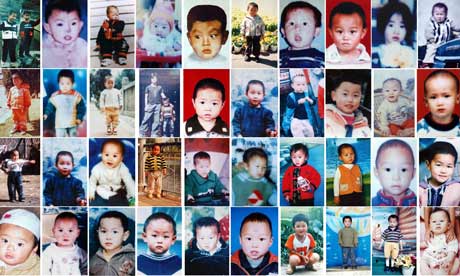Police arrest more than 600 people from two child trafficking networks after six-month investigation involving 5,000 officers

Chinese police have arrested more than 600 people and rescued 178 children in crackdowns on two trafficking networks.
The ministry of public security said on Wednesday that 5,000 officers across 10 provinces had been involved in the six-month investigation.
Authorities recorded 5,900 cases of trafficked children in China last year, although experts believe the true figure is much higher. Many children are recorded simply as missing because their parents cannot prove they were kidnapped.
Boys are particularly at risk and command higher prices as they are often sold to rural families who want an heir. Older girls are bought as brides for sons, while others are forced to work or to beg on the streets, experts say.
The raids appear to have taken place last week, but police in the south-western Sichuan province first discovered one group which had sold 26 children to other parts of the country while dealing with a traffic accident in May. They named the ringleader as Cai Lianchao.
Separately, police in the eastern Fujian province detected an "outsize" gang trading children across provinces in August. They named one member as Chen Xiumei but did not identify the other suspects.
The ministry's statement said the rescued children have been put in the care of female police officers and will be placed in orphanages until their parents can be found.
"Police departments will continue to crack down on child trafficking and ensure that involved children are kept out of the reach of buyers," it added.
The cases demonstrate the sophistication and reach of many of the trafficking operations, with abducted children often traded across the country to make it harder to find them. Police recently reported rescuing infants trafficked across the border from Vietnam as well.
Parents have complained of police inefficiency and indifference. In many cases their search for their missing children has relied primarily on their own efforts and those of others who have been affected.
Microbloggers have also sought to reunite families by sharing pictures of missing children and those seen begging on the streets.
Authorities stepped up efforts to tackle the problem two years ago. The ministry's statement said police had cracked more than 7,000 trafficking rings since April 2009, rescuing more than 18,500 children and 34,500 women.
They have also launched a DNA database to help match children with parents, since many are snatched as babies or toddlers.
Despite their efforts, however, some children have been returned to the families that bought them because it has proved impossible to track down their parents and they have become attached to their new families.
Chen Shiqu of the ministry of public security said the main cause of the crime was demand and that buyers should lose both money and children, but it is not clear whether that policy will be applied to all cases.
Chinese criminal law says that buyers are not held criminally responsible as long as they have not mistreated the children or obstructed the police rescue operation.
Authorities are also considering amending the law on adoptions. At present children cannot be adopted if their parents cannot be traced, and must be left in care homes.


No comments:
Post a Comment